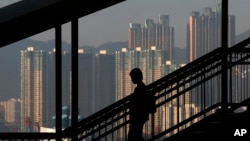The U.S. Federal Reserve is likely to succeed in reining in home prices where Hong Kong's government has failed and property investors in one of the world's most expensive real estate markets are already bracing for a slump.
The Fed is expected to raise interest rates by June at the earliest, its first monetary tightening measure since 2006. If history is anything to go by, Hong Kong's monthly residential real estate sales could plunge more than three-fold when that happens.
Some industry experts forecast home prices to fall by over a third by end-2016, clouding the prospects of major developers CK Hutchison Holdings Ltd, owned by Asia's richest man Li Ka-shing, and Sun Hung Kai Properties Ltd.
An increase in U.S. rates would also trigger a rise in Hong Kong because the local currency is pegged to the U.S. dollar, paving the way for monthly mortgage repayments to jump nearly a fifth by the end of 2016 in a city where the household debt, by some measures, is at a record high.
"Don't buy. You have to wait for another two years," said Jacinto Tong, chief executive of property firm Gale Well Group which has investments exceeding HK$30 billion ($3.9 billion).
Hong Kong home prices have surged over 130 percent since 2008 when the Fed adopted its near-zero rate policy, due to low interest rates and a supply shortage, shrugging off a series of cooling measures and posing policy challenges to the government of embattled leader Leung Chun-ying.
In 2005, a mortgage rate hike drove monthly sales of private homes to fall by about three-quarters in eight months, and many fear a repeat performance when the Fed hikes rates.
A 50 basis point hike in mortgage rates by end-2015 would increase monthly repayments on a 20-year mortgage by 4.7 percent, said Barclays property analyst Paul Louie, using the latest official median Fed rate target forecasts.
Holding all else constant, Hong Kong home owners could face a jump in monthly mortgage payments of 17 percent and 30 percent, respectively, by the end of 2016 and 2017. The household debt to GDP ratio is already at a record high 64 percent.
"Without the visibility of where interest rates may peak out, we believe some home buyers are likely to take a wait-and- see attitude," said Louie, who expects a 15 percent drop in home prices this year and a further 15 percent fall in 2016.
"We recommend investors reduce their weighting to Hong Kong property stocks," he added.
For many home owners, a rate hike means leaner times in a city where the average home price is 17 times more than household income, according to consultancy Demographia.
Hong Kong's private new home transactions jumped to a record high in 2014, with 80 percent of purchasers first-time buyers - a group analysts say would be hardest hit by a mortgage hike.
For Brian Cheung, a 28-year-old nurse in Hong Kong who just bought a HK$7.2 million apartment with his girlfriend, a higher mortgage means more stringent discretionary spending.
Cheung and his girlfriend spend a quarter of their combined monthly salaries on their mortgage, and a rate hike could increase that HK$15,000 payment by about a third.
"It's going to be a huge burden for me," he said. "If it happens, the extra will definitely come from our living expenses."





